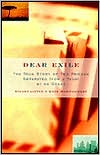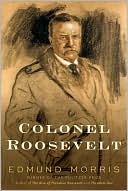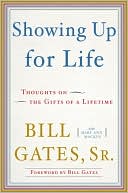Dear Exile: The True Story of Two Friends Separated (for a Year) by an Ocean
A funny and moving story told through the letters of two women nurturing a friendship as they are separated by distance, experience, and time.\ Close friends and former college roommates, Hilary Liftin and Kate Montgomery promised to write when Kate's Peace Corps assignment took her to Africa. Over the course of a single year, they exchanged an offbeat and moving series of letters from rural Kenya to New York City and back again.\ Kate, an idealistic teacher, meets unexpected...
Search in google:
In simple terms, Dear Exile is a great read. The letters between New Yorker Hilary Liftin and Peace Corps volunteer Kate Montgomery transport you to worlds as different as an isolated Kenyan village and the New York real estate market. Both Kate and Hilary -- and reading their personal correspondence makes you feel like you can call them by their first names -- have a talent for telling good stories with wit, self-awareness, and an eye for detail that brings to life the room they are in and the people they are with. But beyond being a collection of colorful, well-written stories, Dear Exile is a relationship. When Kate and Hilary wrote these letters, both women were just out of college and trying to find their way in the world. Kate went to Kenya. Hilary moved to New York City. Their stories are particular to the places they live, but their experiences are universal. The letters below, taken from different parts of the book, show both the adventurous storytelling side of the book and the underlying bond between the authors that makes Dear Exile a personal story for any reader. Publishers Weekly One woman has the privilege of a happy, secure marriage while confronting the poverty of a Third World country. The other enjoys the luxuries of a big American city while struggling to find romantic happiness. In this humorous, touching, real-as-daylight collection of letters former college roommates Liftin and Montgomery exchanged during their year apart, we see the support and humor two 20-something women can offer each other as they move down disparate paths. In the small Kenyan town where she and her husband are spending 12 months as Peace Corps volunteers, Montgomery realizes that, although she can gamely adjust to eating rancid goat stew, living with fist-sized spiders and having her house exorcised of genies, the tasks of caning students until they bleed and teaching them to "sit down and shut up" while their headmaster uses their textbook money to buy himself a new pickup truck are beyond her limits of cultural assimilation. Meanwhile, back in New York City, Liftin tackles her own obstacles, including finding an apartment in Manhattan, surviving the embarrassing loss of her "cybervirginity," enduring the threats of a paranoid neighbor and recovering from the pain of unreciprocated love. Though Liftin's problems can pale in comparison to Montgomery's, the duo's correspondence makes it clear that their relationship has thrived precisely because of their unconditional recognition of the immediacy and importance of each other's travails. Many women readers will be reminded of their own intense college and postcollege friendships, and may be inspired to try to reconnect with lost friends. This is a smoothly sewn book that appeals on several levels: as engaging travel literature, as a witty exploration of modern women's lives and as a testament to the power and blessing of friendship.
Kwale, May 31\ Dear Hilary,\ This business of having to write letters to keep up friendships definitely separates the wheat from the chaff. You are the wheat. (That would be the good part?)\ Our new neighbor, Mwanamisi, came over last night to show me how to make coconut rice, wali wa nazi. Kate, you say, but you already know how to make coconut rice! Yes, I say, but I don't know how to make friends. So David and I were rushing around trying to make reality match what we had probably said in Kiswahili. (I think we said we'd 'already' cleaned the rice and we 'were doing' laundry.) Mwanamisi arrived midway through the coconut-milk-making process and was chatting with us about how to cook it really well, soft and sweet. As far as I could tell, she was complimenting me on what I had done so far, except there was one little part that I didn't catch, and her tone was less spunky, so I figured I probably didn't put enough salt in or something. But, all in all, I was pretty excited at not being totally incompetent at cooking.\ Later, I checked on that verb to figure out what I'd done wrong. Here's what my dictionary said about it. (I mean, I just "haribu"-ed it--how bad could it be, right?) "kuharibu: v. injure, destroy, spoil, damage, ruin, demoralize, spoil work, break up an expedition, devastate a country, cause miscarriage, pervert, corrupt." That's what I did to the rice. Good thing we like potatoes, eh?\ Love, Kate\ New York City, December 19th\ Dear Kate,\ I have obeyed my rules and leapt empty-handed into the void. Much as I try to explain to myself that I am in transition and that everything will turn out fine, I'm hardly the happy camper we remember. I'm living at my dad's now. My eyelid has had a twitch ever since I moved in here. It's a delicate fluttering twitch that others don't seem to see, but to me it feels like there's a bird in my head beating itself against the window of my eye. So right now I hardly recognize myself. I wake up in a strange apartment. I hide away my bed and all signs of me.\ I commute out of the city--away from all my friends and the places I know--to work at a sterile office at an ill-defined new job in a big, generic office building on a highway in Westchester. I'm just waiting: waiting to accumulate a foundation of knowledge that will get me the right job; waiting to get my own apartment so I can make noise and be a person; waiting to hail a cab and smile at the person getting out and see that stranger again and again.\ Most of all right now, I can't wait to live alone. The finances of buying an apartment are impossible, but I'm willing to make adjustments. No long distance service, for example, no food on weekdays, drugstore makeup, factory-second panty hose, found art. I can't wait to acquire "homeowner's insurance." I want to have my stereo going when I fall asleep. I want all the messages to be for me. I want to bring home strangers and store their body parts in my freezer. I want to polyurethane floors and leave the toilet seat up (Oh wait, I'm a girl.) and throw away all the plastic grocery bags, which wouldn't even accumulate anyway since I don't shop. I want the shower to be a hundred percent available. I want to have parties and not clean up.\ Oh, and how much do I miss you? Let me count the ways: I miss you like the plague; I miss you because you understand everything I say and because for all I know when I say I see blue everyone else might see green but I'm pretty sure you see blue; I miss you because when you get back you're going to be really different and dirty; I miss you because you are not coming to my Christmas party; I miss you because you are speaking Kiswahili and I can't and I'm afraid you'll never come home; I miss you as often as I check my voice mail (which is like every minute); I miss you because I don't trust anyone else's sanity (except maybe my brother's); I miss you more than I miss all my stored belongings and with a force that is just a tiny bit less than my desire to find a lifetime companion; I miss you because the park is covered in snow and I haven't been there yet; I miss you because I think you love me unconditionally and I definitely do you. This turned into a love letter, is that so wrong?\ Goodbye my dirty friend, goodbye,\ Hilary
\ From Barnes & NobleTwo good friends, ten thousand miles between them, and dozens of letters back and forth. These features make up the compelling face of Dear Exile, but the real strength of this collected correspondence between two 20-something women lies beneath the surface in the relationship they share, the worlds they inhabit, and the lives they are trying to sort out.\ \ \ \ \ Publishers Weekly - Publisher's Weekly\ One woman has the privilege of a happy, secure marriage while confronting the poverty of a Third World country. The other enjoys the luxuries of a big American city while struggling to find romantic happiness. In this humorous, touching, real-as-daylight collection of letters former college roommates Liftin and Montgomery exchanged during their year apart, we see the support and humor two 20-something women can offer each other as they move down disparate paths. \ In the small Kenyan town where she and her husband are spending 12 months as Peace Corps volunteers, Montgomery realizes that, although she can gamely adjust to eating rancid goat stew, living with fist-sized spiders and having her house exorcised of genies, the tasks of caning students until they bleed and teaching them to "sit down and shut up" while their headmaster uses their textbook money to buy himself a new pickup truck are beyond her limits of cultural assimilation. Meanwhile, back in New York City, Liftin tackles her own obstacles, including finding an apartment in Manhattan, surviving the embarrassing loss of her "cybervirginity," enduring the threats of a paranoid neighbor and recovering from the pain of unreciprocated love. Though Liftin's problems can pale in comparison to Montgomery's, the duo's correspondence makes it clear that their relationship has thrived precisely because of their unconditional recognition of the immediacy and importance of each other's travails.\ Many women readers will be reminded of their own intense college and postcollege friendships, and may be inspired to try to reconnect with lost friends. This is a smoothly sewn book that appeals on several levels: as engaging travel literature, as a witty exploration of modern women's lives and as a testament to the power and blessing of friendship.\ \ \ \ Library JournalYA-College roommates Kate Montgomery and Hilary Liftin went in different directions after they graduated. Kate married and went to Kenya with her husband to teach with the Peace Corps, while Hilary attempted to conquer Manhattan. This book consists of their letters during the year they were separated. Kate's letters were full of life in Africa-the heat and disease, the lack of school supplies where she taught, the absence of personal and public amenities, and the political machinations of local authorities. Hilary wrote about the snow, the difficulties of finding a place to live, her attempt at a career that was never fully described, her family's complicated relationships, and her social life (or lack thereof). These two young women maintained their friendship and found comfort and sustenance in the letters they exchanged. For young adults, the appeal of this book lies in the contrasts of life in Kenya versus life in the Big Apple, in the importance of an enduring friendship, and in seeing the challenges that young people are apt to face as they make their way in the world.-Pamela B. Rearden, Centreville Regional Library, Fairfax County, VA Copyright 1999 Cahners Business Information.\ \ \ \ \ Jane MannersFormer Yale roommates Hilary Liftin and Kate Montgomery share a year's worth of correspondence in Dear Exile: The True Story of Two Friends Seperated (For A Year) by an Ocean. After college, Liftin worked for an internet company in Manhattan and Montgomery signed on to teach with the Peace Corps in eastern Kenya. The collected letters, which were written during Montgomery's year abroad, contrast the obstacles each woman confronts in her new environment. Montgomery makes light of a treacherous ride on a crowded minitruck while suffering from an upset stomache; Liftin gives a tongue-in-cheek account of the discomforts of living with her father. Throughout the exchange, both women combine humor and gravity in describing the challenges they face. Dear Exile is most striking for the global perspective it offers readers in juxtaposing Liftin's urban woes with the hardships faced by Montgomery and her Kenyan neighbors.\ —Brill's Content\ \ \ \ \ Denise KerstenAn encouraging look at the post-college world as well as a tribute to female friendship. It seems that there is, indeed, both life and friendship after college.\ — USA Today\ \ \ \ \ Kirkus ReviewsThe year-long correspondence between two former college roommates—one a smart, utterly self-absorbed young Manhattanite, the other a droll yet stubbornly idealistic Peace Corps volunteer—becomes a funny, harrowing, heartbreaking meditation on life, love, suffering, and friendship. A few years after graduation, Hilary finds herself summoned to the City Hall wedding of her friend Kate, who embarks shortly thereafter for Kenya, where she and her husband will work as English teachers. The two friends pledge to keep in touch; the letters that comprise the book turn this promise into print. In the beginning, Kate pens breezy missives out of Africa, emphasizing the exotic and the comic, particularly the gastrointestinal consequences of existing on a diet of rancid goat meat and orange Fanta. But as the year goes on, Kate's letters turn darker in tone as she battles malaria, is sickened by contaminated water, and watches helplessly as her students, who are routinely beaten by school authorities, erupt into violence. In counterpoint to her friend's stories of real if temporary deprivation, Hilary's urban tales of woe round up the usual suspects of middle-class life: men she wants who don't want her, "brutal" commutes, endless business meetings, and, for good manure, a possibly psychotic downstairs neighbor. Though she sometimes becomes downright silly, Hilary is not blind to the ironies of her privileged situation. Instead, she champions the validity of everyday unhappiness. "I realize how this may sound in context of the crisis in Kwale," she writes after a painful breakup, "but love counts, even in warfare." Elegantly written, this correspondence reads like miniature essays onsubjects as diverse as loneliness, clementines, the joy (and pain) of cybersex, and how to behave while one's concrete hut is being exorcised. Above all, this book affirms the power of friendship as expressed in the nearly lost art of letter writing. (Author tour)\ \








